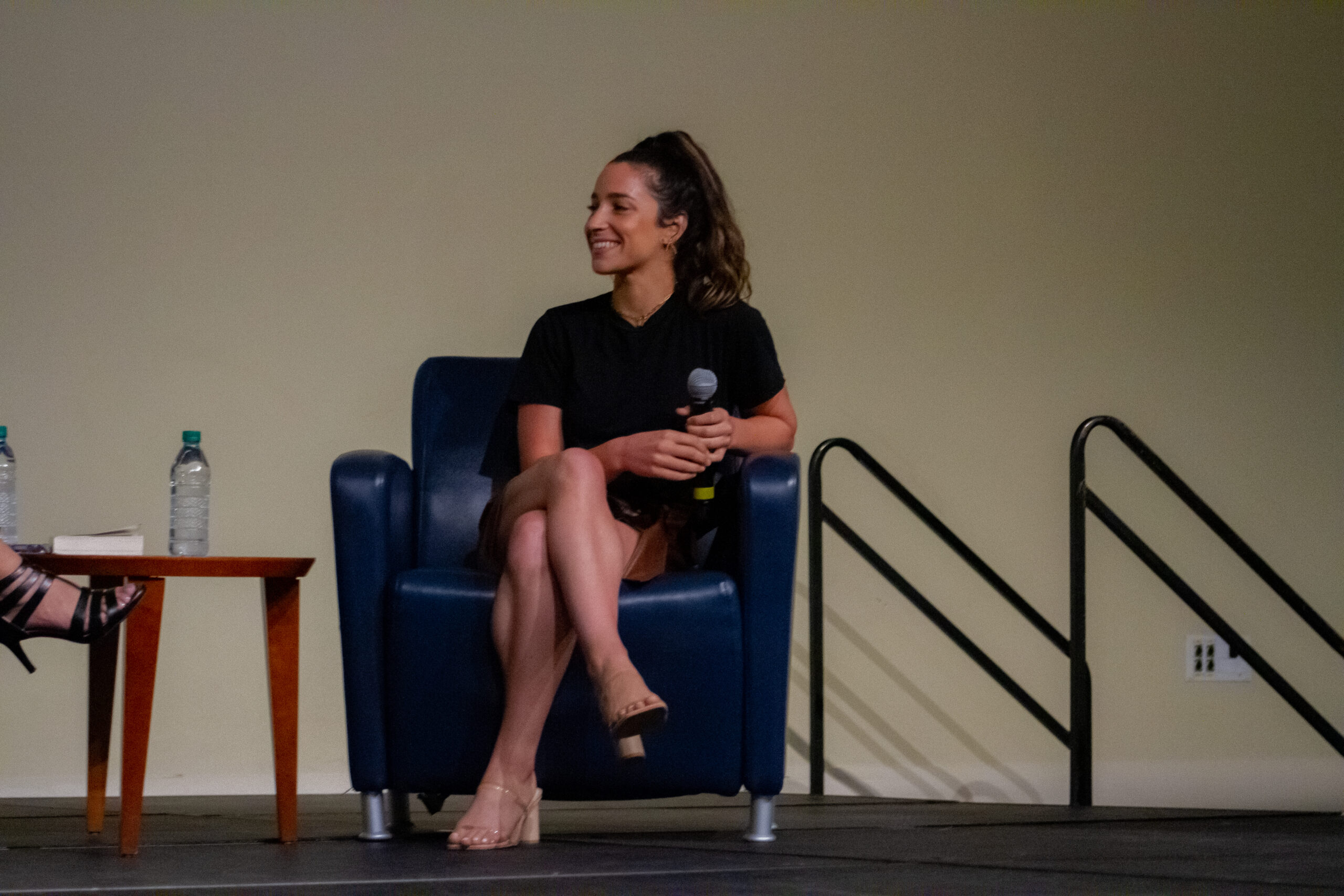Aly Raisman opens up on self-growth, personal life

Three-time Olympic gold medalist Aly Raisman advised students in attendance at Tuesday’s University Lecture Series (ULS) that life is more than winning and competing, as she offered insight to some of the ways she is currently discovering herself outside of gymnastics.
Raisman cited that the support she has from her parents and the relationships she built with her teammates mean more to her than any of the competitions she has participated in.
“People will forget how many medals you have, but they won’t forget the person you are,” she said.
For the duration of the hourlong talk, Raisman spoke on topics of self-love and confidence. She also spent time discussing her Olympic career and giving advice on how to cope and live with traumatic events.
There were 349 students who preregistered for the event, according to BullsConnect.
Monica L. Miranda, director of the Center for Student Involvement, was the moderator for the discussion. Raisman first talked about her own identity, and highlighted her life outside of the media bubble.
“I feel like the Aly that people may know is probably the gymnast, and for some people maybe they know me as being a survivor,” she said. “I think for me personally, I like to say that I am the oldest of four. I love being a big sister. I love hanging out with my friends and my family.”
Raisman went on to elaborate that finding her passions outside of gymnastics has been a long and very rewarding experience for her.
“I love finding things that make me feel present and appreciative. So I’m kind of on this fun journey of figuring out who I am outside of all of that,” she said. “It’s been really great and I feel super lucky that I’m on this journey. If you Google me, if you take away everything, ‘Who am I?’”
When describing her parents’ influence on her, Raisman said having a solid support system helped her immensely in her confidence.
“I feel very lucky that my parents were very supportive and wanted me to be happy,” she said. “When I would finish practice, they weren’t asking me why I didn’t do this skill or why I didn’t do this better. They just always wanted to make sure I was OK.
“I truly knew that if I didn’t do well, if I didn’t bring home the gold medal, I knew that my parents would love me. And to have that support was everything to me.”
Other teammates she grew up with were not as fortunate as her, Raisman said, as their parents were incredibly harsh on them and they would burn out before getting a chance to move further with gymnastics. Experiencing this allowed her to see the importance of balance and normalcy, according to Raisman.
At one point in the discussion, Miranda shifted the discussion to ask about Raisman’s experience as a survivor of sexual abuse, and how she found the inspiration to advocate for herself and others.
Larry Nassar, former team doctor of the U.S. women’s national gymnastics team, was accused in 2015 by over 100 athletes of sexual misconduct, with Raisman being one of them. Raisman told TIME the first incident occurred when she was only 16 years old.
Raisman said a big factor in her healing process is recognizing her opportunity for self growth, and recognizing her future potential.
“I’ve gotten to a point where I’ve recognized I can’t change what happened to me, I can’t change how it’s affected me. There are certain moments in my life where I feel like I wasn’t happy and I can’t get that time back,” she said.
“But what I can change is realizing that I can grow from this and I can control being a better person. Because I went through something really hard and I think there’s something powerful in remembering that we all go through ups and downs in life and we all are human.”
Balancing the healing process with public pressure has been difficult for Raisman, as she said discovering ways to maintain both aspects is something she is still learning how to deal with.
“I’m still on this journey. And when I shared my story of being a survivor of abuse, I hadn’t really done much healing on my own,” she said. “I was trying to navigate that publicly at the same time, which was very challenging.
“I’m trying to figure out how to listen to my body more and have the balance of doing therapy but also giving myself permission to kind of take a break from talking about it publicly, and really doing the work on the inside … It’s hard to try to heal while you’re also talking about it. I’m still navigating.”
Following the conventional round of questions, Miranda transitioned the conversation to ask a series of “rapid fire” questions, in which Raisman would provide brief answers to less formal questions.
Questions during this segment ranged from asking what her favorite meal was after a competition to the best piece of advice she had been given that she could share.
To close out the discussion, Raisman answered questions some audience members had sent in digitally before the event began, such as about her time in the Olympics.
Raisman was honest about what her unconventionally favorite part of the Olympics was, which drew laughter from the crowd.
“My favorite part of the Olympic competition is honestly when it’s over,” she said. “There’s a lot of really special and amazing moments, but you also feel like you’re going to vomit the whole time. So I think when it’s over, it’s just that feeling of relief and you feel so satisfied.”







